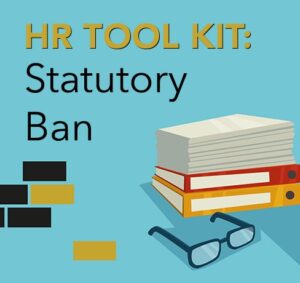 What do you do as a business if you find out that an employee has a statutory ban that means they can no longer do their job?
What do you do as a business if you find out that an employee has a statutory ban that means they can no longer do their job?
Some employers may think that getting rid of them instantly is justified given the circumstances, and that will stand up under scrutiny.
The reality is that like everything in Employment Law, a fair process needs to have been followed in order for the dismissal to be found within the bands of reasonable responses (assuming the employee has more than 2 years’ service to bring a claim for unfair dismissal).
What is a Statutory Ban?
A statutory ban is a restriction that is placed on an individual whereby their continued activities would contravene a law within the UK. The most common examples of this include, but aren’t limited to:
- Ban on driving where the employee’s duties are predominately driving
- Illegal working i.e. no longer has the right to work
- An employee placed on the BDS Barred List whose duties include work with vulnerable adults or children
What process do you need to follow?
Investigation
Like everything, a fair process needs to be followed. As with any formal action, a fair investigation needs to take place to obtain all the facts of the situation, and it is highly recommended that you have an investigation meeting with the employee in question and get their side of the story around what has happened.
Once the investigation has been completed, and all evidence has been gathered, the investigation manager will need to decide if the matter requires moving to a formal meeting.
Some of the evidence can include contacting public bodies to acquire the correct information and have it confirmed by the relevant authorities.
In the case where an employee has no right to work, the employee can be suspended without pay as they have no legal right to receive pay at the point, as they had no right to work.
However, if it is found that they had the right to work, and it was an error somewhere along the line, the employee would be entitled to pay during that period.
Formal Hearing
Following the investigation, should it be the requirement to move to a formal hearing, the employee should be given the right to be accompanied, and all the evidence and facts of the situation sent to them in advance to prepare their defense and gather their own information should it be required.
At the hearing, the employee can put forward their side of the case.
It might be they agree with the full evidence and understand that this is a formal process that the company needs to follow in order to obtain a fair dismissal under the Statutory Ban provisions.
After the hearing, it is then for the manager that conducted the formal meeting to determine whether the employee can remain employed, or whether their statutory ban means that they have to be dismissed from their employment.
The difficult judgments
For most statutory ban situations, the outcome and decision could be uncomplicated, such as an employee no longer having the right to work.
However, there will be situations whereby the company needs to consider more than just the statutory ban itself.
For example, in the case where an employee who predominately drives for their role and has received a driving ban, other factors that will need to be considered are:
- How long is the ban for?
- Can the employee use other methods to get around i.e. public transport and what effect will this have on their role?
- Are there other suitable roles that can be offered that would be considered reasonable to do so in the circumstances?
No one size fits all
Statutory Bans are unique to each company, the setup of the company, and the employee’s circumstances.
There is no one size fits all, and the employer has to take into consideration all the circumstances of this case by itself before making a decision on what it wants to do with the employee.
To find out more about Statutory Bans and how NORi HR can help, contact NORi HR & Employment Law on 01254 947829 or use our online contact form and we’ll get back to you as soon as possible.





